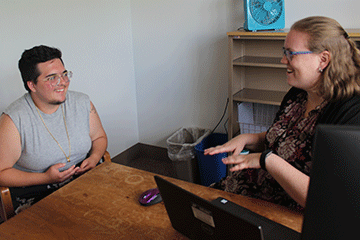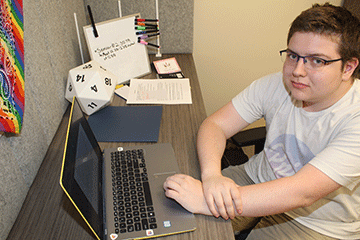
07/19/2022
Does Thanos, the Marvel Cinematic Universe’s genocidal supervillain, reflect the fears of actual humans living through the COVID-19 pandemic?
An undergraduate student at SUNY Cortland plans to spend the summer checking it out.
For 10 weeks, SUNY Cortland senior Lawrence Bruce is combing the online superheroes universe for literary clues to the question surrounding the superpowered character who instantly erased half the comic world’s human population in “Avengers: Infinity War.”
“Superhero films in particular speak back to what we’re experiencing in real life,” said Bruce, a dual major in social philosophy and English from Bath, N.Y.
He’s one of six 2022 SUNY Cortland undergraduate research summer fellows. Following a hiatus during the pandemic, a cohort of eager undergraduates is continuing the university’s 16-year-old program. From late May until Aug. 2, it offers each scholar a residence hall bed, a campus research space, a $4,000 stipend and the opportunity to focus on a research project. Through the support of the Undergraduate Research Council, faculty earn $2,000 to mentor a student, doubling the stipend from prior years.
And whereas the program once conjured up images of test tubes, neurotransmitters, laboratories and field research nearby and abroad (in this year’s case, Turkey), in fact the program has grown in scope well beyond its early physical sciences focus.
“There’s really no major where you don’t need rigorous inquiry,” said Maria Timberlake, who currently chairs the university’s Undergraduate Research Council and also serves as associate professor and chair of the university’s Foundations and Social Advocacy Department.
“There’s no major where all questions have been answered, whether that’s physical education or philosophy, or any kind of social science, not just the more traditional sciences,” she said. “We’ve been trying to look not only at ‘How do we create more opportunities to involve students in research’ but equally important is ‘How do we communicate that to students and faculty to say, ‘This means you, too.’”
The message is getting through. Four of this year’s participants are exploring areas of social science. And some come from campus community groups previously underrepresented in the program.

The council also collects more demographic information on its undergraduate research participants, including racial or ethnic identity, original gender identity, and whether or not they have a disability.
Junior Fellow Eric Von Roeschaub, a transgender student and longtime LBGTQIA+ advocate, is investigating the unique needs and challenges for queer and questioning children and youth who grow up outside of cities in a study titled “Rural Transgender and Gender Non-conforming Youth Family Functioning.”
“A huge part of being in the queer community is exactly that, community,” said Von Roeschaub, an inclusive childhood education major and women’s, gender and sexuality studies minor from Port Washington, N.Y.
“It’s easy to access in urban areas (such as where he grew up), not so much in rural. Coming to college has made that even clearer to me,” said Von Roeschaub, who has a disability that sometimes makes it necessary for him to communicate via text-to-speech assistive software.
With his faculty mentor, SUNY Cortland Health Professor Jena Curtis, he is conducting a qualitative survey involving Zoom face-to-face interviews of trans children and their parents, reached through national organizations that support the transgender community.
“Literally we are talking life or death here,” Curtis said. “The question of ‘Do youth survive their experiences figuring out their gender identity and then living as their authentic selves?’ is really about ‘Do they have supportive parents and families?’ We’re trying to figure out how to support youth and what family dynamics support youth to survive.”
Von Roeschaub addresses each child or youth who self-identifies as LGBTQIA+ while Curtis speaks with the parent. They purposely teamed up to look at families in parent-child pairs, an approach called dyadic interviewing. Often used in qualitative research, dyadic interviewing in this instance is meant to reassure parents about the safety, ethics and legitimacy of the study and to let Curtis observe and mentor Von Roeschaub.
Von Roeschaub expects the findings to result in a co-authored paper and a presentation at Transformations, the university’s annual student scholarship and creativity conference, as well as practical information that families can use to support their queer or questioning child.
“I think that, having done this research, he’s going to be more credible as a teacher talking about why this is so important,” Curtis said. “And we need more teachers who understand the value of inclusion for all genders.”
“A really important thing to me about being transgender is the fact that I can be visible and open about it,” Von Roeschaub said. “A lot of youth don’t have the privilege, especially the vulnerable ones who may not have the physical community there to support them, or who just can’t access it for being closeted. I have a personal rule that if it will help even one person, it’s worth it.”
Meanwhile, Bruce has teamed up with mentor Adrienne Raw, an assistant professor in the English Department, meeting weekly to discuss his progress on the study “The Blip and COVID: Responses to Mass Crisis and How Science Fiction Becomes Reality.”
Raw, who focused her own doctoral research on the rhetoric of video games and online fandom communities, shows how this newer genre of English literature is growing rapidly as an area of academic inquiry.
“There is a direct link here,” Raw said. “Lawrence’s project is in my area but is not something I’ve ever written about or thought about. And it’s interesting to think that there are things I’m working on that can add to Lawrence’s project.”
The superhero universe has evolved from pulp magazines of the early 20th century to an avalanche of books, films, television series, interactive video games and fan club websites. Bruce is exploring how contemporary people use superheroes to cope with big, scary realities like pandemics. “The Blip” refers to the fantasy moment in “Avengers: Infinity War” when half the people in the universe disappeared with a snap of Thano’s fingers.
“Part of my argument is with Covid we talk about getting back to normal,” Bruce said. “But that is impossible because people have died and things have changed. With ‘The Blip,’ even when they can bring back all the people that were blipped, everything’s changed.”
“We’re having these conversations in real life,” Bruce said.
Timberlake noted that the Undergraduate Research Council recently expanded one of its internal grants adding an introductory level focused on motivating students who may not have research experience or see themselves as researcher, to develop an interest or idea for their own further exploration. While the URC has a strong history of offering various project funding, mentoring and generous summer fellowships to students, these smaller grants might support library supplies, limited data collection or limited transcribing.
Timberlake recently shared Cortland’s progress in using its undergraduate research program to encourage and support the participation of disabled students and faculty at the National Undergraduate Research Conference in Washington, D.C., an event focused on “Evaluating Barriers to Access and Improving the Undergraduate Research Experience.”
“SUNY Cortland is working in multiple ways to explicitly value diversity, equity and inclusion and our research program is a vital part of that commitment,” Timberlake said.
“I feel like we’re continually evolving and learning what it means to be an institution that supports diverse students and faculty. Undergraduate research is doing our part and that makes me happy.”
In recent times including this year, every student’s summer research fellowship has been supported by the generosity of alumni and friends in the form of permanent undergraduate research endowments managed by the Cortland College Foundation. Bruce’s work was underwritten by a fellowship from Sandra Laghi Cerulli ’68 and Dr. Maurice Cerulli. VonRoeschaub’s research was funded by a fellowship from the late Nancy A. Johnson ’48, M ’56. Four other students were supported this year by fellowships endowed by Bernie LoBracco M ’74 and Karen LoBracco ’74; W. Hubert Keen, Ph.D., and Sally Keen; the David F. Berger, Ph.D., fellowship funded by Dr. Michael J. Bond ’75 and Dr. Wayne Marley ’75; and the William H. Hopkins fellowship created by Sheri Baron ’77.